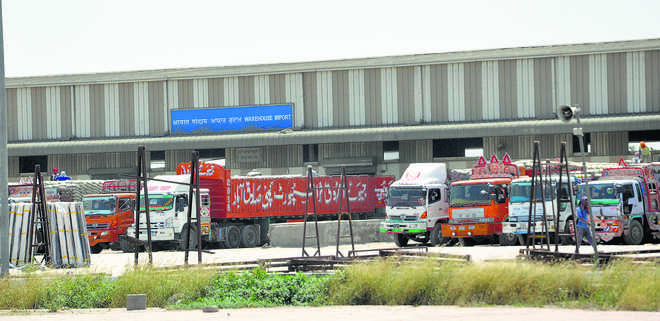
Target: To regain the confidence of investors, a strong signal is needed from both sides that the conflict will be de-escalated.
Jayshree Sengupta
Senior fellow, Observer Research Foundation
RECENTLY, The Economist called India and Pakistan ‘natural trade partners’. Indeed, if there were friendly relations between the two neighbours, trade and investment partnership would have flourished and the welfare gains would have benefited the common person on both sides. In agriculture, manufacturing and services, much complementarity exists between the two countries. India is Pakistan’s giant neighbour with 130-crore population and huge resources. Pakistan is grappling with high inflation, rising sovereign and domestic debt, a falling currency (138.39 Pakistan rupees to a dollar) and a fiscal deficit of 5.1 per cent.
The official trade between the two countries is small at $2.4 billion. It could have been many times more, according to the World Bank, and could reach $37 billion if there were no tariff or non-tariff barriers.
Smuggling amounting to another $5 billion takes place along the border. A substantial amount of trade also takes place through countries such as the UAE and Singapore, amounting to $5-10 billion. After 2012, there have been no business negotiations between the two countries. A roadmap was worked out between their commerce secretaries for improving trade and investment in September 2012.There was a meeting between the Prime Ministers in 2014 and an attempt was made to normalise trade. Prime Minister Narendra Modi promised to look into making visa processing easier for businessmen from Pakistan.
After the Pulwama terror attack, India revoked the Most Favoured Nation (MFN) status which it had granted to Pakistan in 1996 in accordance with the World Trade Organisation (WTO) rules, under which all WTO members have to grant MFN status to their trade partners who are also members of the WTO. It involves granting them equal tariff treatment. India has granted Pakistan the same for more than two decades. But after the recent conflict, India is set to impose 200 per cent duty on all Pakistani exports.
Pakistan has not granted MFN status to India all these years, even though their Parliament had approved of it. It is possible that many ordinary Pakistanis, especially those working in micro, small and medium enterprises, would suffer after the steep increase in custom duties imposed by India. There are reports that Pakistani goods are lying at the Wagah-Attari border because Indian businessmen are failing to lift them on account of the high duty added. These include sports goods, steel instruments like knives and scissors, surgical instruments and cement.
In the past, Pakistan and India trade never really took off, even though the latter reduced the negative list of banned imports under the SAFTA (South Asian Free Trade Agreement), initiated under SAARC. Pakistan continued to have a long negative list of 1,209 items that acted as an effective non-tariff trade barrier. Among the banned goods on Pakistan’s list are textiles, garments, pharmaceuticals, plastic and polymer, cars, trucks and auto parts.
Even though trade is not playing an important part in bilateral relations, Pakistan cannot afford to have a prolonged conflict with India because its economy is in a shambles. It is in urgent need of a bailout from the International Monetary Fund (IMF) of around $12 billion. It needs more foreign aid and loans from other sources, but its credit rating by international agencies has fallen. Recently, Saudi Arabia and China have given $2 billion each in loans to Pakistan.
Its net forex reserves are at a very low of $7.2 billion, which can support imports for just six weeks. Its trade deficit is at $31.2 billion. The foreign investment inflows are not enough to finance the trade deficit.
India is in a more comfortable position regarding forex reserves of around $405 billion, but its economic outlook is not as bright as before because its GDP growth has slowed down to 6.6 per cent recently. The foreign investment inflows have also slowed down and investors are waiting and watching on two counts — the outcome of the forthcoming elections and the fear of escalation of the armed conflict between India and Pakistan. To regain the confidence of investors, a strong signal is needed from both sides that the conflict will be de-escalated.
The threat of a prolonged conflict may witness a slowdown of FPI (Foreign Portfolio Investment) inflows into India that will have an adverse effect on the rupee. Following the Pulwama attack, FPIs withdrew Rs 3,000 crore from the Indian markets. The Royal Bank of Canada has predicted that the rupee will decline to Rs 80 to a dollar in 2019. India imports 83 per cent of its oil needs and if there is also a rise in the crude prices, the rupee will have a free fall.
The escalation of the conflict will mean diversion of budgetary resources towards the buying of arms. India is the second biggest arms purchaser in the world. For two developing countries in which millions are living below the poverty line, it makes little sense to keep buying arms from highly advanced countries like Russia, Israel and the US. Both India and Pakistan are ranked low on the Human Development Index (HDI) and are burdened by poor social and physical infrastructure. There is high unemployment in both countries and they urgently need to increase public expenditure on health and education.
Under such circumstances, any escalation of war will increase the financial burden on both nations and make ordinary people suffer as the governments will spend more on arms than on improving the quality of life, which includes expenditure on reducing environmental pollution. Dialogue between the two countries is very important at this juncture for defusing the geopolitical tension in the region.



























